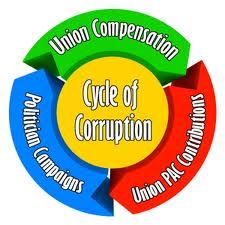Stockton ruling, like Vergara ruling, shakes CA status quo
by Chris Reed | October 2, 2014 11:00 am
 Californians who think the state status quo is nuts and that public employees amount to a protected class of citizens have gotten unexpected help this year from the state and federal courts.
Californians who think the state status quo is nuts and that public employees amount to a protected class of citizens have gotten unexpected help this year from the state and federal courts.
First came Los Angeles Superior Court Judge Rolf True’s ruling[1] that teacher tenure laws are unconstitutional and “shock the conscience” because they protect incompetent teachers and funnel them to the schools in poor minority communities that most need the best teachers.
Now U.S. Bankruptcy Judge Christopher Klein has struck another blow for sanity by rejecting CalPERS’ argument that the city of Stockton can’t cut the pensions of city employees and retirees as it tries to get out of bankruptcy. CalPERS’ claim that state laws somehow trump federal laws has always seemed strange. Klein’s comments Wednesday certainly reflected that view. This is from Ed Mendel at calpensions.com[2]:
Part of his analysis yesterday that CalPERS pensions are not state “governmental or political powers” protected under federal bankruptcy law is that while state workers are in CalPERS by statute, cities choose to join CalPERS.
Klein said California cities have the option of forming their own pension systems, joining a county pension system, hiring a private pension provider or withdrawing from CalPERS, if they can afford to do so.
He concluded that benefits not prescribed by state law are not “governmental or political” powers protected by the federal bankruptcy law, but instead are unprotected “business powers.”
Klein said a CalPERS-sponsored state law preventing cities from rejecting their CalPERS contracts in bankruptcy is “flat-out invalid” under the constitutional “supremacy clause” giving federal law priority over state law.
The judge said another CalPERS-sponsored state law that gives CalPERS a lien on all city assets, except wages, when they declare insolvency is an invalid attempt by the state Legislature to “edit” the federal bankruptcy law.
Judge: “Why should I take [CalPERS claim] seriously?
The New York Times treated this ruling as a major national story and made a point that California coverage did not: “Judge Klein’s ruling went beyond anything that Stockton was seeking.” More from the NYT[3]:
Calpers had argued that if Stockton stopped making payments and dropped out of the state pension system, the lien would let it claim $1.6 billion of its assets. But Judge Klein said those statutory powers were suspended once a California city received federal bankruptcy protection.
“Why should I take that lien seriously?” he asked a lawyer for Calpers, Michael Gearin. …
“The bankruptcy code provides that the lien can be avoided and be treated as an unsecured claim,” Judge Klein said.
Judge Klein also said that Stockton had many options other than Calpers for retirement benefits: a private provider, like an insurance company; a multiemployer pension plan affiliated with a union; one of California’s county-run pension plans; or it could even offer no pensions at all.
“There are lots of permutations and combinations out there with respect to the art of the possible,” he said, adding that nothing in the law required any city to give its business to Calpers. “The whole world is out there.”
Conservatives, libertarians and believers in small government have long viewed the courts with suspicion. That’s especially so in California, where conservative ballot propositions have often been scrapped or enfeebled by courts but liberal ballot measures rarely seem to get picked apart.
But Judge Treu and Judge Klein go against that narrative — and offer hope that a new balance of power is coming in a state dominated for too long by public employee unions.
- Judge Rolf True’s ruling: http://studentsmatter.org/our-case/vergara-v-california-case-status/
- calpensions.com: http://calpensions.com/2014/10/02/bankruptcy-judge-calpers-pensions-can-be-cut/
- the NYT: http://dealbook.nytimes.com/2014/10/01/judge-rules-that-bankruptcy-invalidates-calpers-lien-against-stockton-calif/?_php=true&_type=blogs&_php=true&_type=blogs&ref=us&_r=1
Source URL: https://calwatchdog.com/2014/10/02/stockton-ruling-like-vergara-ruling-shakes-ca-status-quo/